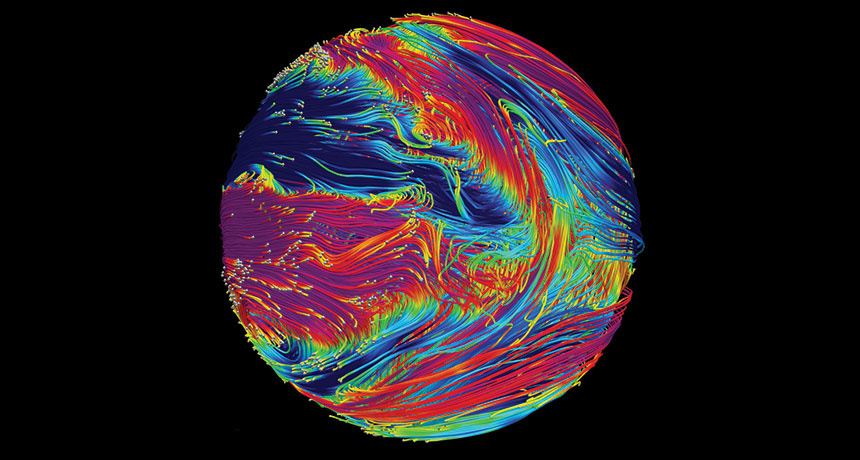Magnetism disrupts winds on ‘hot Jupiter’ exoplanet

HAT-P 7b is a windy world. Stiff easterlies typically whip through the atmosphere of the distant exoplanet, but sometimes the powerful gales blow in surprisingly varied directions. Now, simulations of the planet’s magnetic field lines, illustrated here as a rainbow of scrawled marks, reveal that HAT-P 7b’s magnetic field influences the winds, even turning some into westerlies. The result, published May 15 in Nature Astronomy, could lead to a better understanding of the atmospheres of other exoplanets.
Known as a “hot Jupiter,” HAT-P 7b is a gas giant that orbits its star once every 2.2 Earth days. The exoplanet, located 1,043 light-years away, is also tidally locked: One side always faces toward its star while the other faces away. That orientation pushes temperatures to about 1,900° Celsius on the planet’s dayside compared with about 900° C on the nightside. Those extreme temperature differences tend to power strong easterly winds, according to an analysis of data from the Kepler satellite. But that analysis also revealed that over time the winds are surprisingly mercurial.
The magnetic field, which may be generated by the planet’s core, is connected to the winds because of high temperatures stripping electrons from atmospheric atoms of lithium, sodium and potassium, making them positively charged. Those particles then interact with the field, creating an electromagnetic force strong enough to disrupt the stout easterly winds, writes study author Tamara Rogers, an astrophysicist at Newcastle University in England.
In the image above, blue lines track strong magnetic field lines directed one way, while those in magenta trace powerful lines in the opposite direction. Weaker parts of the field lines are shown in green and yellow. The stronger the magnetic field, the wilder the winds — with the strongest lines completely reversing the direction the winds blow, Rogers concludes.